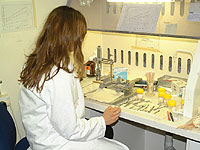|
|||||||||||||||||||||||||||||||||||||||||
| Medical Science - 3991 | |||||||||||||||||||||||||||||||||||||||||

For students entering Medical Science in Stage 1 prior to 2007 or Stage 2 prior to 2008, the previous plan description and rules apply. Please click here.
This three-year degree program is jointly offered by the Faculty of Medicine and the Faculty of Science. It provides the basis for a career in biomedical research and is also an appropriate first degree for students planning to enter graduate medical or paramedical programs. Medical science is the area of science which underpins the practice of medicine. It incorporates study of the structure and chemistry of the cells that make up living organisms (Cell & Molecular Biology and Biochemistry) with particular reference to man, and specifically of the structure and function of the human body (Anatomy and Physiology). It then deals with the general processes leading to disease (Pathology), the role of bacteria, viruses and other microorganisms in disease (Microbiology) as well as drugs which are used to cure human diseases (Pharmacology). Other areas available for study include the way in which our form and function is inherited (Genetics), the processes of development from the fertilised ovum (Embryology), the natural defences of the body (Immunology) and the study of the structure and function of the brain (Neuroscience). Students enrolled in this program may have the opportunity to undertake a fourth year that involves a research program leading to an Honours degree. A limited number of high-performing students may be able to gain entry to the UNSW Medicine program with advanced standing. For more information, please click here. Students intending to apply for entry via this pathway must have completed all compulsory courses by the end of Stage 2.
Program Objectives and Learning Outcomes Students enrolled in this program will have the opportunity to gain a broad perspective of the biomedical sciences, as well as having the opportunity to specialise in one or more of the above disciplines.
Stage 1
Elective course offered by a School in the Faculty of Science (6 UoC)
(recommended: Psychology, Physics or Mathematics)
Elective course offered by a School in the Faculty of Science (6 UoC)
(recommended: Statistics for Life & Social Sciences, Psychology or Physics)
When selecting elective courses in Stage 1 and/or Stage 2, students need to note that they must complete MATH1041 Statistics for Life & Social Sciences by the end of Stage 2.
Stage 2
The 48 UoC of courses taken in this Stage must include at least 36 UoC from the following 6 UoC courses, all of which must be completed by the end of Stage 3. When making choices for Stage 2, students need to take account of prerequisite requirements for courses in Stage 3, in particular with respect to their intended area of specialisation.
Students who do not take all of the above courses in Stage 2 may select up to 12 UOC of electives. When making these choices, students must seek academic advice. In addition, when selecting elective courses in Stage 1 and/or Stage 2, students need to note that they must complete MATH1041 Statistics for Life & Social Sciences by the end of Stage 2.
Stage 3**
Electives from a Medical Sciences list*** 24 UoC
Other electives 12 UoC
General Education electives 12 UoC
* Students who have completed high school Biology with a score of at least 75 and achieved at least a credit in
BABS1201 can substitute BIOS2021 Genetics for BIOS1101.
** Progression to Stages 3 and 4 is subject to academic performance. To remain in the program, a student is required
to maintain a WAM of at least 65.
*** At least 24 UoC from the following 6 UoC courses: when making these choices, intending Honours students must
consult with the School about requirements for Honours prior to Stage 3 of the program.
ANAT2341 Embryology: Early and Systematic Development
ANAT3121 Visceral Anatomy ANAT3131 Functional Anatomy 1 ANAT3141 Functional Anatomy 2 ANAT3231 Cell Biology ANAT3411 Neuroanatomy ANAT3421 Neuroscience Research Seminars PHPH3121 Membrane and Cellular Physiology PHPH3131 Neurophysiology PHPH3211 Cardiovascular Physiology and Pathophysiology PHPH3221 Endocrine, Reproductive and Developmental Physiology PHPH3502 Skeletal Muscle in Health and Exercise PHPH3101 Rational Drug Design PHPH3251 Clinical and Experimental Pharmacology PATH3205 Molecular Basis of Disease A PATH3206 Molecular Basis of Disease B PATH3207 Musculoskeletal Diseases BIOC3111 Molecular Biology of Proteins BIOC3121 Molecular Biology of Nucleic Acids BIOC3261 Human Biochemistry BIOC3271 Molecular Cell Biology BIOC3281 Recombinant DNA Techniques and Eukaryotic Molecular Biology BIOC3621 Molecular Biology of Nucleic Acids (Advanced) BIOC3671 Molecular Cell Biology (Advanced) BIOT3061 Biopharmaceuticals BIOT3071 Commercial Biotechnology BIOC3151 Human Genetics and Variation BIOC3291 Genes, Genomes and Evolution MICR3021 Microbial Genetics MICR3041 Immunology 1 MICR3051 Immunology 2 MICR3061 Viruses and Disease MICR3081 Bacteria and Disease MICR3611 Microbial Physiology: A Molecular Approach MICR3621 Microbial Genetics (Advanced) MICR3641 Immunology 1 (Advanced) Honours is available to suitably qualified students and consists of a project in conjunction with any required coursework (total 48 UoC). Progression to Stage 4 Honours is subject to academic performance (a WAM of at least 65). Students seeking to enrol in Honours are required to have the permission of the Head of School and have completed all the requirements for Stages1, 2 and 3 of the BMedSc.
For information regarding fees for UNSW programs, please refer to the following website: https://my.unsw.edu.au/student/fees/FeesMainPage.html
|
|||||||||||||||||||||||||||||||||||||||||


